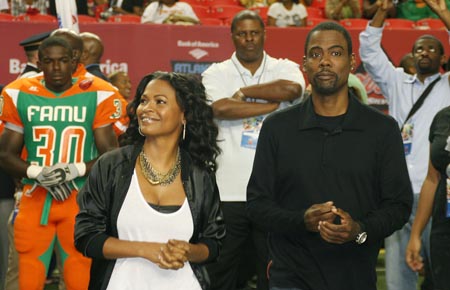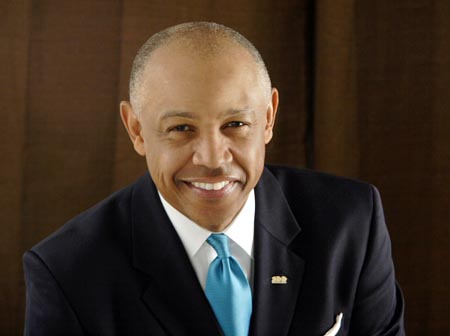Advertising. Entertainment. Planning. Travel.
Each year tens of thousands of fans converge in football stadiums around the nation to celebrate college rivalry, meeting of friends and just a whole lot of family fun. A marketers delight – these showdowns present opportunities for retail, online, mobile, on-site branding activation and more. Often called Black College Reunions, there are over 50 Classics held yearly and they have evolved into big business. No one appreciates the latter statement more than 100 Black Men of Atlanta, Inc. “The tagline around the last couple of Atlanta Football Classics is History Happens Here,” says John Grant, Jr., CEO, 100 Black Men of Atlanta, Inc.
 How does a 501c3 get involved with sports entertainment?
How does a 501c3 get involved with sports entertainment?
The Atlanta Football Classic (AFC) has a rich history in its origin. Grant vividly recalls its development. Actually 21 years ago, 100 Black Men of Atlanta, Inc. (the 100) recognized they needed a way to fund the commitment to their flagship program, Project Success, a post-secondary preparation and tuition assistance program for at-risk youth. The 100 had committed to paying college expenses for 35 students when they graduated from high school. One of their members, Leon Odom, a graduate of Tennessee State (TSU), floated the idea of bringing the TSU and Florida A&M University (FAMU) game to Atlanta. It was an opportunity to revive a historic rivalry that was already in place and to bring that rivalry to Atlanta, Georgia, an equal distance between Nashville, Tennessee and Tallahassee, Florida – making it the perfect meeting place for both universities. After rounds of meetings and negotiations among interested and affected parties, the AFC as we now know it, was launched. TSU and FAMU have been the two participating teams since 1996.
What is the economic impact of this event?
The AFC has generated more than $125 million for the Georgia economy over the past five years. This year’s Classic weekend attracted 51,500 attendees and pumped almost $30 million dollars into the Georgia economy. Tickets for the event are sold in 35 states, the District of Columbia, Canada and the Virgin Islands. Annual activities include a range of entertaining and educational events supported by blue chip sponsors. Held at the Georgia Dome, this year’s activities kicked off with a town hall meeting focused on health care disparities that exist in the African-American community, a job fair supported by Georgia Department of Labor and Bank of America, Celebrate Health Celebrate Living Fair presented by Abbott Laboratories and College Fair presented by the U.S. Army, the AllState STEP Showdown, the Coors Light pre-game concert and the famed McDonald’s halftime show featuring award-winning marching bands as well as the Tyson Foods Band Jamboree, plus a post-game visit to America I AM: The African American Imprint exhibit. Findings from the 100’s survey show: A) a large number of attendees come from the Georgia area, B) the average household income is nearly $70k, and C) 62% are females. Revenue spend is tracked by industry: #1 – lodging, #2 – shopping, #3 – food and beverage, #4 – tickets/souvenirs and #5 – transportation, in order of highest dollar spend.
 How does the Classic create value?
How does the Classic create value?
While the game is a fundraising event for teams and the 100, it is more than just a football weekend. As a by-product, the game creates a pipeline for students who get a taste of the HBCU experience, a point of importance to the power of the game. TSU and FAMU recruit more scholars from the Atlanta area than any other market in the United States, according to Grant. “We want to make sure this is a quality of life experience for participants. We do this because it is a core part of what our organization is all about. The Classic is a celebration of excellence, opportunity, family and tradition. We work very hard with our members, volunteers, sponsors and the community to deliver that,” states Grant.
To find out more about 100 Black Men of Atlanta visit:
http://www.100blackmen-atlanta.org.
For comments about this article contact:
fpertilla@globalbusinessdevelopers.com.